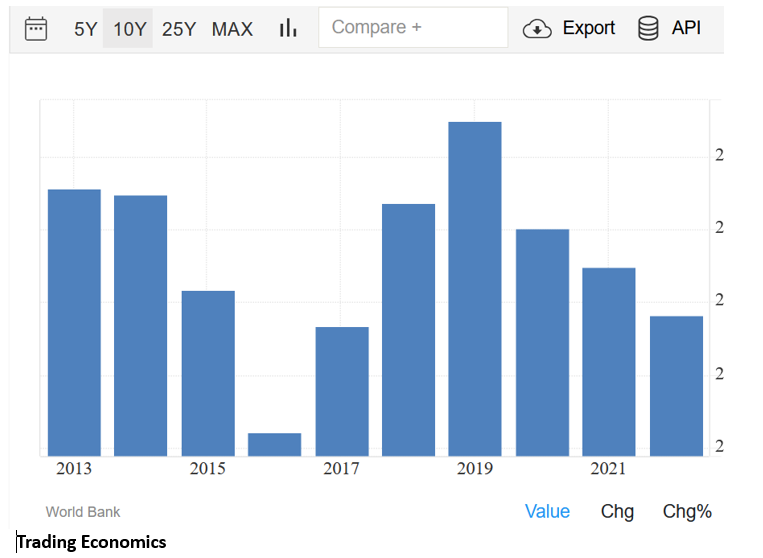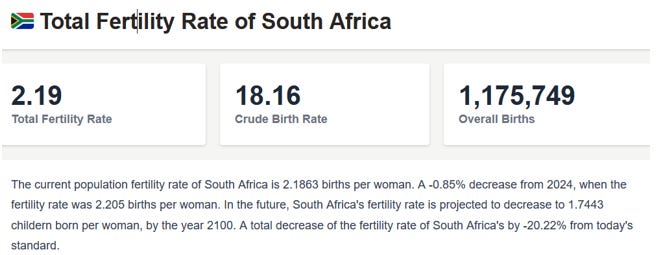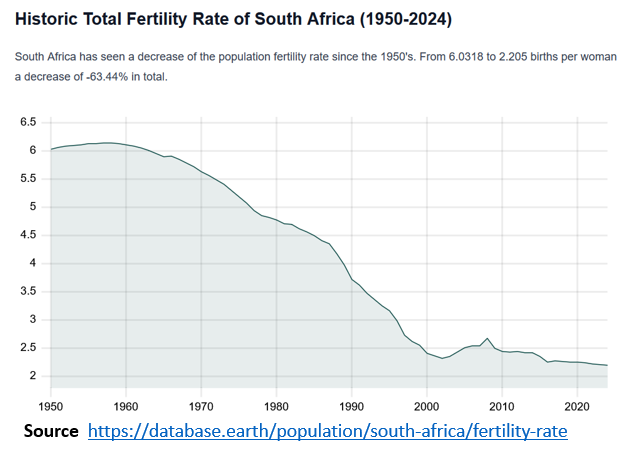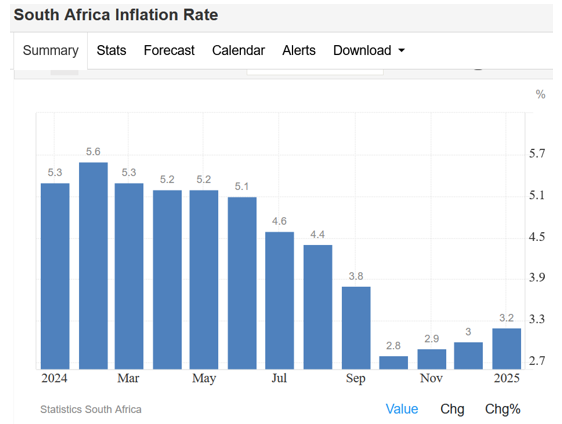SA; GLOBAL SOUTH STRATEGY – SA Needs USA? - Land Act - Germany - Trump v Zelensky -Ukraine $ - USAID - DePopulation & Energy - Inflation - Resilient SA - Shoes - Letter from South Africa - [03-08-25]
"We don't need to get into the geopolitical ramifications of Trump's ego-centric foreign policy to agree that American democracy should be for Americans." [Karine Jean-Pierre]
DECODING US-SA TENSIONS AND THEIR GLOBAL IMPLICATIONS. What many observers miss in the US-SA tension is its strategic timing. The pressure campaign coincides precisely with SA’s emerging role as a key motivator of the Global South’s new financial architecture.
Beyond the BRICS+ bloc’s expansion, SA’s central bank has been quietly pioneering cross-border payment systems that could fundamentally alter African trade dynamics. While the Starlink broad-based-BEE clash captures headlines, the real concern lies in SA’s potential to accelerate African financial independence through its innovative clearing mechanisms and digital currency initiatives.
Perhaps most telling is SA’s sophisticated orchestration of multilateral relationships. By simultaneously deepening ties with China through the Belt and Road Initiative, maintaining strategic dialogues with the EU on green technology transfer, and expanding trade with other BRICS+ nations, SA has created a complex web of interdependencies that limits the effectiveness of US unilateral pressure. This multi-aligned approach has transformed traditional vulnerabilities into strategic advantages.
SA’s International Court of Justice case against Israel represents more than a moral stance; it is a masterclass in strategic positioning. By grounding its challenge in international law, rather than political rhetoric, SA has created a template for Global South nations to effectively leverage international institutions.
The legal framework chosen deliberately echoes precedents set by Western nations, making it difficult for them to dismiss without undermining the very international order the West seeks to defend. This approach forces Western powers to either defend their institutional frameworks or expose their selective application of their oppressive 'Rules-based International Order'.
The Expropriation Act’s significance extends beyond domestic policy: it represents a test case for whether African nations can implement structural economic changes whilst maintaining international investment appeal. The Government of National Unity (GNU) delegation’s international mission occured at a pivotal moment when land reform has become a proxy battle for competing development models.
What critics, such as AfriForum, have missed is that similar policies in Asian economies actually attracted long-term investment by demonstrating state capacity for complex economic management. The current tensions create unexpected leverage points for SA. Recent trade data reveals a telling shift: SA’s trade with BRICS+ states grew by 28% in 2023, while EU trade volumes were stable, demonstrating the country’s successful balancing act.
US pressure has ironically strengthened SA’s credibility among emerging economies seeking policy independence. As Brazil’s finance minister noted a year ago: “SA’s resistance to unilateral pressure has created a blueprint for maintaining sovereign policy space while engaging constructively with all partners.”
The effectiveness of this approach was demonstrated in recent multilateral negotiations, in which SA’s simultaneous engagement with multiple stakeholders created competitive pressure for better terms. A senior Asian diplomat observed: “When one party’s pressure tactics result in improved offers from other partners, the original pressure becomes self-defeating.” This dynamic has already yielded results: new investment commitments from both Western and Eastern partners increased by 34% in late 2023, with notably improved terms for technology transfer. For policymakers, several hidden strategic imperatives emerge:
SA should reposition BBBEE requirements as innovation drivers that create unique market opportunities. The success of South Korean conglomerates demonstrates how local partnership requirements can evolve into globally competitive ventures.
The Expropriation Act should be framed as a mechanism for unlocking new market value, drawing parallels to how Japanese post-war land reform catalysed its economic miracle by creating a broader base of economically active citizens.
SA should develop asymmetric response capabilities in financial markets, particularly through the acceleration of alternative payment systems and digital trade platforms that reduce vulnerability to traditional US pressure points.
A critical, yet underexplored dimension, is SA’s emerging position in data governance and digital sovereignty. The country’s stance on data localisation and digital infrastructure ownership has profound implications for economic independence and national security. The GNU delegation to Washington should articulate how SA’s policies align with global trends towards data sovereignty while ensuring continued participation in global digital markets.
SA’s leadership on African continental integration offers another layer of strategic advantage. By accelerating implementation of the African Continental Free Trade Area and strengthening regional financial integration, SA can build resilience against Western external pressure while creating new opportunities for economic growth. The key is maintaining multiple credible alternatives while demonstrating commitment to mutually beneficial outcomes.
The next two are likely to see increased pressure through informal channels, particularly targeting SA’s financial sector and technology infrastructure. Recent diplomatic successes offer a template for response. When faced with pressure over its infrastructure choices in early 2024, SA’s strategic engagement with multiple partners led to a 40% improvement in financing terms across competing offers.
As one African central banker noted: “The key is maintaining multiple credible alternatives while demonstrating commitment to mutually beneficial outcomes.” The GNU delegation’s success hinges on recognising these evolving dynamics. Traditional pressure tactics become less effective when facing a partner that maintains multiple viable alternatives while demonstrating willingness to engage constructively with all parties.
Recent evidence suggests that nations maintaining this balanced approach secured on average 30% better terms in international negotiations compared with those that aligned exclusively with any single bloc. Success for the GNU delegation lies in recognising that current tensions offer an opportunity to negotiate a new model of international engagement. This requires moving beyond traditional diplomatic responses towards creating innovative partnership frameworks that serve transformation goals and international interests.
The real challenge is not managing US pressure, but rather seizing this moment to establish precedents for how the Global South nations can pursue economic sovereignty whilst remaining engaged in global markets. “The question isn’t whether we can resist pressure, but whether we can transform pressure into partnership,” noted one senior diplomat.
This moment demands more than diplomatic finesse; it requires re-imagining how nations navigate between domestic imperatives and international expectations. SA’s response could define a new playbook for economic diplomacy in a multipolar world, one in which resistance to Western pressure becomes a catalyst for innovation in international relations. Source
Mafinyani is risk advisory & financial modelling partner at DiSeFu, a specialised financial technology and risk advisory firm operating in the Sub-Saharan region.
Reference:
The U20 is an engagement group of the Group of 20 (G20). South Africa has taken over the Presidency of the G20 for 2025. “This is our moment to lead. Not just as the City of Tshwane or the City of Johannesburg, but as Africa’s voice in the global urban conversation." “Through U20 2025, we have the opportunity to shape a future that is just, sustainable, and inclusive. A future where African cities are not just participants but leaders in the global urban agenda." https://www.sanews.gov.za/south-africa/u20-south-africa-africas-moment-lead
DOES SOUTH AFRICA NEED AMERICA? - GOOD QUESTION
Economists have raised the alarm that South Africa could be facing sanctions from the United States as diplomatic and foreign policy tensions continue to escalate. The latest fallout relates to an article penned by president Cyril Ramaphosa and other leaders in Foreign Policy, in which the president painted a picture of growing discontent within South Africa toward the United States.
While the focus of the article was on Israel’s war in Gaza, it took aim at US President Donald Trump and America’s role in the conflict. It stated, in no uncertain terms, that South Africa would heed the International Criminal Court’s (ICC) arrest warrant for Israeli Prime Minister Benjamin Netanyahu and would block Israeli vessels carrying military supplies from the country’s ports.
This stands in stark contrast to South Africa’s previous handling of ICC arrest warrants, where it infamously failed to arrest Sudanese President Omar al-Bashir, citing diplomatic immunity. According to Aluma Capital chief economist Frederick Mitchell, the article has not been well-received by the United States and now poses severe implications for the future of US-South Africa relations. Source
Another disaster for South Africa [or is it?] https://businesstech.co.za/news/business-opinion/814819/another-disaster-for-south-africa/?utm_source=everlytic&utm_medium=newsletter&utm_campaign=businesstech
STOP PRESS – [Hat Tip B_MC at TBP- lightly edited]: A Conversation on the Expropriation Act in conjunction with the little known Land Courts Act
A lot of people are quibbling over the Expropriation Act and what it might mean. However, the situation is more complicated than first appears, because it is not a standalone piece of legislation. There is also the Land Courts Act, which was passed and signed, but not yet promulgated.
The Expropriation Act allows a large number of state entities (including the Land Affairs Ministry, run by the PAC) to seize land before a trial, and to calculate the value of the land against the value of any development the state intends to perform on that land. Other criteria for expropriation include if the property "is being used for speculation purposes." This is difficult to define, and leaves a lot of leeway for the state to purchase any property not directly owned by its residents.
A concern is if the land is "unused" or "abandoned.". This can include land which has been seized by squatters. The Ramaphosa administration has also passed an Act which prevents anyone from removing squatters, or preventing entrance into their property, by any means except a verbal warning, and forces them to resort exclusively to the police (who seldom respond in any reasonable time) to defend their property. If the squatter sets up any form of structure (this can be as little as an outhouse-sized tin shack and a folding chair), they cannot be removed except by court order.
The court can, and has in many instances, ruled that the occupiers have a right to remain until alternative housing has been provided by the state or the property owners, and in some cases, has expropriated property in order to transfer the land to the state or the residents for the purpose of township upgrades - free housing, water and electricity reticulation. These strict squatters rights laws are defended by the PIE and ESTA Acts. And in the past, these expropriations had to be compensated. Now they don't.
This is very similar to the methods used by Robert Mugabe to seize farms - they were simply seized, and transferred after the fact. In many cases in South Africa, these land grabs include building hijackings, and on open land, ANC and EFF branch members and organised crime plotting out swathes of land from which they then extract rent. This is widespread, and lucrative.
However, thus far the courts have been used for removals, even if it is expensive, sluggish, and often unsuccessful. The court system allows landowners to appeal expropriation under the new Act (after the land is already taken - they will have 40 days to remove once they have received notice). This Act of Parliament establishes a new court system explicitly for the streamlining of accelerated expropriation.
It will be selected directly by the Presidency, and the JSC will act only in an advisory capacity. It will have equal jurisdiction to the High Courts, leaving only the Supreme Court of Appeal and the Constitutional Court itself as a means of appeal. The judges of this court will also be immune from all forms of prosecution or legal summons except for acts of domestic violence [13(1)]. Proceedings under this Act may be instituted by:
the Commission
any person acting in their own interest
any person acting on behalf of another person who cannot act in their own name
any person acting as a member of, or in the interests of, a group or class of persons
any person acting in the public interest
any association acting in the interests of its members.
This opens the way for anyone to launch proceedings to expropriate any piece of land for any purpose, from an expropriating authority, to a historic land claimant, to merely someone who wants something they covet.
Witnesses, and anyone who accompanies them to court, are to be monetarily compensated for hearsay, and documents without providence have the same weight as any official document: [21(1)]. The Court may, in the case of claims under the Restitution of Land Rights Act admit evidence, including oral evidence, which it considers relevant and cogent to the matter being heard, whether or not such evidence would be admissible in any other court of law. [2]
Without derogating from the generality of subsection (1), it is competent for any party before the Court to adduce:
hearsay evidence regarding the circumstances surrounding the dispossession of a land right or rights and the rules governing the allocation and occupation of land within a claimant community at the time of such dispossession
expert evidence regarding the historical and anthropological facts relevant to any particular land claim [3]
The Court must give such weight to any evidence adduced in terms of subsections (1) and (2) as it deems appropriate. [4] Whenever a judgment, order or other record of the Court is required to be proved or inspected or referred to in any manner, a copy of such judgment, order or other record duly certified as such by the registrar of the Court under its seal is prima facie evidence thereof, without proof of the authenticity of such registrar's signature.
Additionally, the Court will have the right to deny the submission of any evidence it wishes if it will speed up the process and reduce cost. This means abolishing the right to a fair trial. The defences of this particular kind of court lie, however, in traditional "African ways of knowing", where oral history is regarded as equally valid to a written record. Whether the Constitutional Court system will accept this is unknown. Source
SA’s New Land Court Act – paving the way for settling land disputes https://www.phinc.co.za/OurInsights/ArticleDetail.aspx?Title=SAs-New-Land-Court-Act--paving-the-way-for-settling-land-disputes
NEWS FLASH - Germany just did the UNTHINKABLE pushing for a return to NAZI-era "spying on your neighbour." Britain and Germany are gone. It's too late, they are toast.
THOUGHT FOR THE WEEK – Was Trump/Vance mean to Zelensky in the Oval Office?
UKRAINE: IT'S ABOUT THE MONEY - IT'S ALWAYS ABOUT THE MONEY. Here is a powerful three minute video on 'X' (subtitles), revealing the deep and dark corruption which has been fuelling this disastrous proxy war from the first moment of its inception. Zelensky is a media creation, a puppet of the West, designed to empty Ukraine of its sovereignty, and ultimately its resources too. Watch and Read.
BREAKING SOUTH AFRICAN NEWS:
SURVIVAL MONITOR – AS GLOBAL TENSIONS ESCALATE, THE QUESTION OF ‘SELF-SUFFCIENCY SURVIVAL’ BECOMES PARAMOUNT.
US foreign assistance to Sub-Saharan Africa totalled $6.5bn in the past financial year covering, among other things, some of the most successful public health initiatives in history. The Trump administration’s decision to suspend foreign assistance programmes and gut the US Agency for International Development (USAID) will have ramifications for millions of lives, erode the US’s soft power on the continent, and the decades of trust and goodwill that have been built.
One of the programmes the US has suspended is the President’s Emergency Plan for Aids Relief (Pepfar), which is credited with saving more than 25 million lives in the region over two decades. In SA, Pepfar funding represents nearly 20% of the country’s annual HIV/Aids programme budget. This should raise concerns across the continent about the potential for reversing progress in tackling the Aids epidemic. Funding from Pepfar targets areas in SA that are heavily burdened by the HIV/Aids epidemic. Source
America First is an opportunity for Africa. There is a need to boost partnerships on the continent in an increasingly uncertain world.
THE ENERGY PROBLEM AND DE-POPULATION CONUNDRUM
The impending de-population of the world, being the first time in recorded human history, is causing a tipping towards fewer and not more inhabitants on planet earth. Nick Eberstadt writes that 70% of humanity now lives in countries with below-replacement fertility rates.
Most developed societies are constructed around a model of continuous growth. Today’s workers pay for today’s retirees, today’s young people generate the innovations that propel economic growth, and right now the heavy burden of aging populations is borne by a thin layer of younger people and young immigrants. This won’t be the case in the future. The social safety nets the Left adores will become unsustainable, and the increasingly unsustainable welfare system will collapse.
Economic growth has gone into reverse; energy limits are forcing economies to contract. I agree with Gail Tverberg who's view has long been that if the world economy does not have enough energy resources, it will have to contract. "The situation is analogous to a baker without enough ingredients to bake the size of cake he wants to make." "Somehow the economy needs to change."
"The world economy seems to be headed in the direction that many economies have encountered in the past: Collapse. Collapse or Decline seems to take place over a period of years. The existing economy is likely to lose complexity over time. For example, with inadequate middle distillates, long-distance shipping and travel will need to be scaled back. Trading patterns will need to change.
The collapse of the Central Government of the Soviet Union took place in 1991, leaving in place more local governments. Something like this could happen again, around the world." "I would not be surprised if the more complex forms of energy start to fail, at least in some parts of the world, fairly soon."
"The self-organising economy seems to make changes on its own based on resource availability and other factors. The situation is very similar to the evolution of plants and animals and the survival of the best adapted. These changes cannot take place simply because of ideas from a particular leader, or group of leaders. There is a physics problem underlying the changes we are experiencing." Source
In this post, I will try to explain some of the changes taking place as the economy begins to reorganise and deal with this inadequate energy supply situation https://ourfiniteworld.com/2025/03/04/energy-limits-are-forcing-the-economy-to-contract/
DE-POPULATION: The prime driver of lower birth rates is what females want in their lives, as opposed to 'need' because females retain a natural drive to bear children but increasingly, women don’t want children. WANT is always stronger than NEED. Why is this so? It’s not entirely clear. What is clear is that pro-natalist policies, in China, France, et al don’t work. Monetary incentives seem to have little, to no influence on whether to have children or not, and carrots and sticks don’t work either.
The Great Creator's instruction, "to go forth and multiply" has been discarded, as have most instructions from on High. The phrase "go forth and multiply" refers to the command in the Bible, [Genesis 1:28] where He instructs humanity to be fruitful, multiply, and fill the earth. This command emphasises the importance of procreation and stewardship over His Creation.
It’s also fascinating that there is only one exception to this phenomenon, this is Africa. Calcutta and Calais are experiencing the same population implosion, as are Muslims and Christians. The only place that is above replacement currently is sub-Saharan Africa. Could this mean that the future of the world may be dominated by Africa in the coming decades? If so, then South Africa's future is bright, because it currently leads the continent in many, if not most, economic and financial parameters.
There are more than two theories about this problem; these are two favourites. Optimism about the future has always been key to global birth rates. As Gen Z grows more morose about their nation, finances, lifestyles, and their own future, Greta Thunberg style, the decision not to have children seems obvious and it is happening now, but it's almost impossible to accurately measure it globally.
The one factor seen clearly is that smartphone use is increasingly impacting human relationships. All these factors, and more, point towards a more dystopian future as envisioned by the Globalist Elites' 'Great Reset', who want fewer people on the planet. Reference:
Is the rise of the smartphone and the global addiction to smartphones contributing to peoples’ choice not to have kids?
?
The fertility rate, total (births per woman) in South Africa was reported at 2.341% in 2022, according to the World Bank collection of development indicators, compiled from officially recognised sources for South Africa.
Summary - The charts and table for the South African fertility rates from 1950 to 2025 according to the United Nations projections are also included to the year 2100.
The current fertility rate for South Africa in 2025 is 2.273 births per woman, a 0.79% decline from 2024:
The fertility rate for South Africa in 2024 was 2.291 births per woman, a 0.78% decline from 2023.
The fertility rate for South Africa in 2023 was 2.309 births per woman, a 0.9% decline from 2022.
The fertility rate for South Africa in 2022 was 2.330 births per woman, a 0.89% decline from 2021.
Source https://www.macrotrends.net/global-metrics/countries/ZAF/south-africa/fertility-rate
INFLATION - South Africa’s inflation rate rose for the third month to 3.2% in January 2025, the highest in four months, compared with market forecasts of 3.3%
The average SA worker is spending more than 57% of their monthly earnings on transport and electricity while underspending on food. The latest Household Affordability Index report compiled by Pietermaritzburg Economic Justice and Dignity (PMBEJD) paints a grim picture of how low-income earners are unable to feed their families with nutritious food.
The index, which tracks the prices of 44 basic foods from 47 supermarkets and 32 butcheries in Johannesburg, Durban, Cape Town, Pietermaritzburg, Mtubatuba in northern KwaZulu-Natal and Springbok in the Northern Cape, shows in January the average cost of the household food basket stood at R5,433.70, a 2% increase from R5,324.86 a year ago. Food is bought after transport and power costs have been paid, leaving R2,051,11 a month for food and everything else.
NARRATIVE BATTLE – WHAT MAKES SOUTH AFRICA SO RESILIENT? Because there are a lot of poor people and they help each other - QED
Unlike in developed countries such as UK, with extensive welfare support, there is little incentive for neighbourly support because "the government will deal with all your problems" is the generally accepted mantra. This has also impacted family cohension, with couples separating at an early stage, and failing to form longterm relationships, which of course, are crucial for raising healthy and happy children.
Furthermore, the imperative of two parents working and hardly making budget, increases financial pressures and incentivises out-sourcing child care. South Africans should be greatful for their minimal welfare support systems because, in adversity, adaptable humans will always find their own solutions to their problems as long as the government gets out of the way.
FINALLY and Talking of Government…
COMING NEXT:
BOOM Global Financial Review - Tuesday, March 11, 2025
The Financial Jigsaw Part 2 - Chapter 9 (41) – HANG THEM! – Saturday, March 15, 2025
REFERENCES
My Book: “The Financial Jigsaw” Parts 1 & 2 Scroll: https://www.researchgate.net/publication/358117070_THE_FINANCIAL_JIGSAW_-_PART_1_-_4th_Edition_2020 including regular updates.
BOOM Finance and Economics Substack (Subscribe for Free) - also on LinkedIn and WordPress. Plus Covid Medical News Network CMN News and BOOM Blog -- All Editorials (over 5 years) -- BOOM Finance and Economics | Designed for Critical Thinkers — UPDATED WEEKLY (wordpress.com)


















South Africa is busy shooting itself in the foot. The USA has always been a powerful friend to the liberation movement, but South Africa's support for the Arab terrorists is a dangerous game.